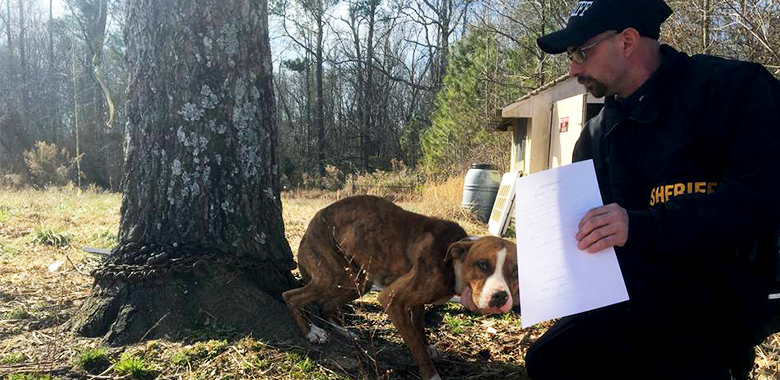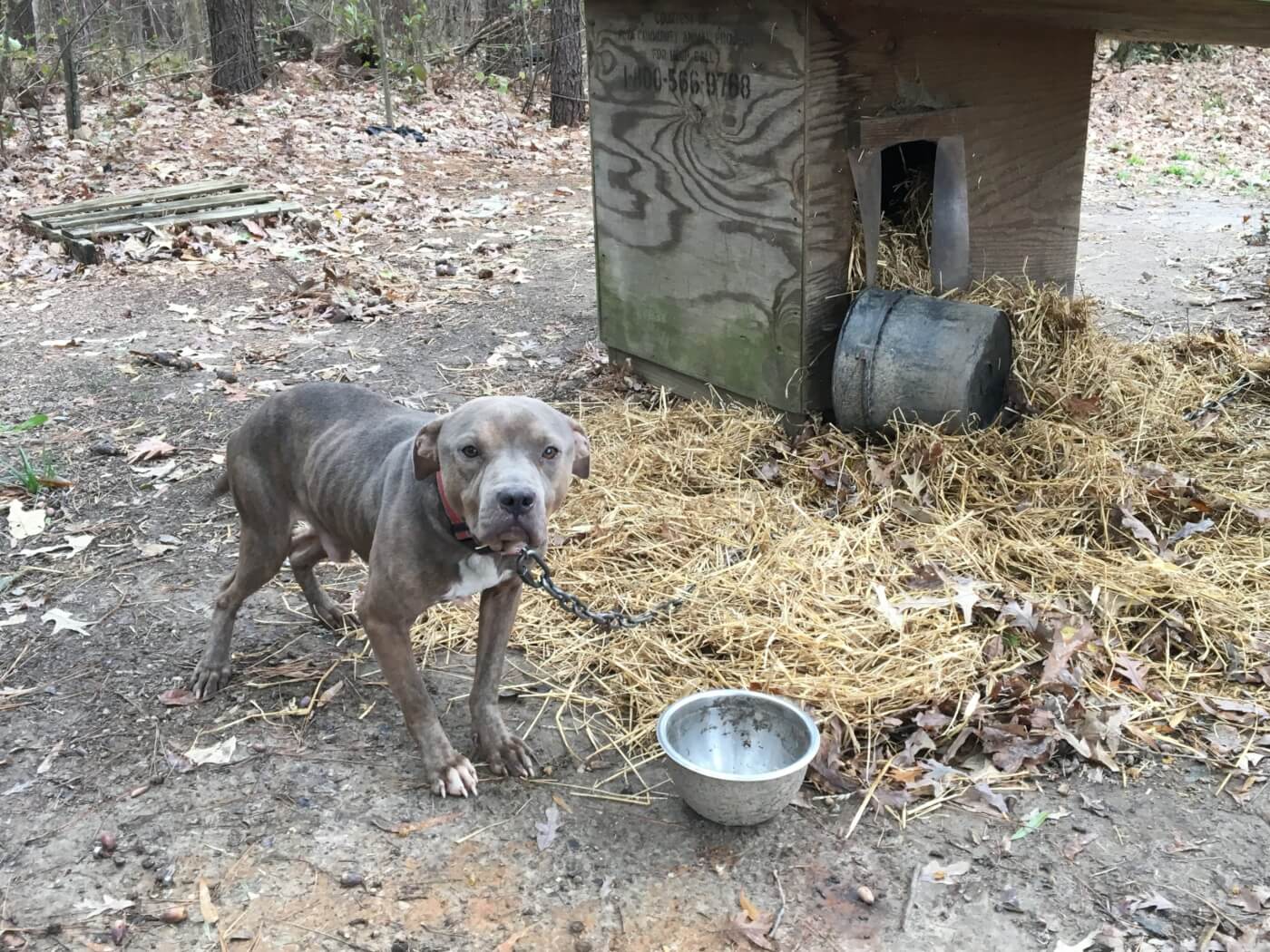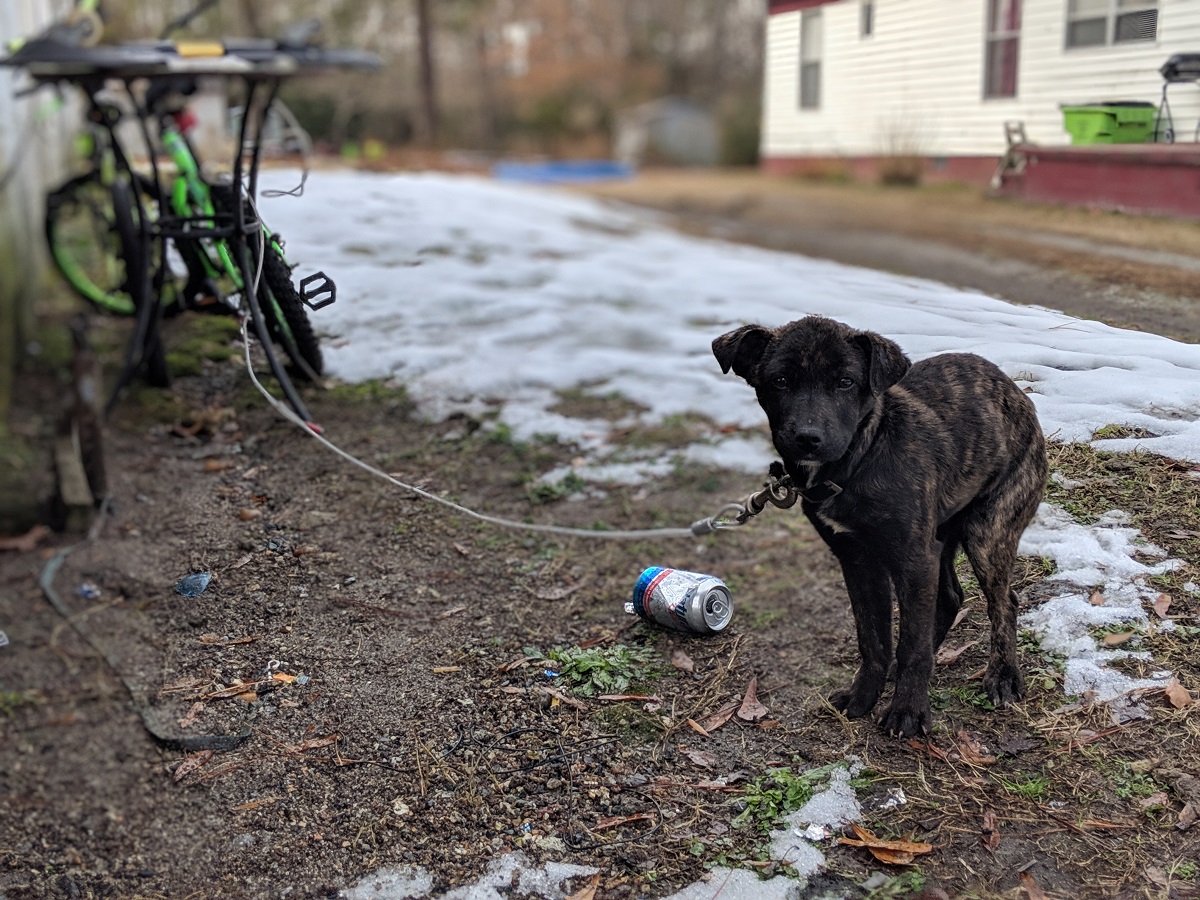What Is a Tethering Ordinance, and How Does It Help Dogs?
PETA’s fieldworkers have helped many chained dogs over the years. While checking on animals in southeastern Virginia and northeastern North Carolina―the area surrounding the Sam Simon Center, our headquarters in Norfolk, Virginia―they encounter countless “outdoor dogs” tethered with heavy chains, which are often attached to too-tight collars. Our fieldworkers give these dogs affection and (after getting the owners’ consent) replace short, heavy chains with long, lightweight tie-outs. And while many dogs’ lives are improved and perhaps even saved by these small steps, there’s something else that could really help them: tethering ordinances.
The most effective way to help chained dogs in a community is to work to get tethering ordinances passed.
Many communities have enacted ordinances that ban or restrict tethering, which help to protect both dogs and public safety. Some of the most notable jurisdictions that have addressed the cruel and dangerous practice of chaining dogs include the following:
Virginia
After four legislative sessions, countless discussions, supportive editorials, hard-fought compromises, and bipartisan collaborations, the state of Virginia passed two desperately needed animal protection bills that prohibit keeping dogs tethered outside during below-freezing temperatures, extreme heat, or hurricanes or other severe storms. The bills also increase the minimum length of a tether from 10 feet to 15 feet.
Suffolk, Virginia
In Suffolk, Virginia―where the winters are cold and windy―dogs may not be tethered while unattended, regardless of whether they’ve been provided with adequate space. PETA was also involved in getting this ordinance―spearheaded by a city council member―passed.

Halifax County, North Carolina
The Halifax County, North Carolina, Code of Ordinances now reads, “It shall be unlawful to tether an unattended dog outdoors.” This change will go into effect on January 1, 2020.
PETA worked for nearly a decade to get chaining banned in Halifax County (where our team visits and helps animals daily) so that no more dogs will have to suffer chained up, forgotten, and lonely. This victory means that dogs in the county won’t have to suffer as Miss Willie (whose owner kept her chained up for more than a decade, despite our fieldworkers’ repeated pleas to be allowed to give her a better life) and Night Train (whose dead, still-chained body was discovered by two PETA volunteers delivering free straw doghouse bedding to dogs) did.

New Jersey
Although it hasn’t banned tethering entirely, New Jersey has addressed it with an impressive state-level statute―something hardly any other states have done. As of 2017, nursing female dogs and puppies under 4 months of age may not be tethered in the Garden State. In addition, dogs may not be tethered between the hours of 11 p.m. and 5 a.m., unless their guardian is outside with them or they’re within view of the person the entire time. Importantly, dogs may also not be tethered outside in adverse environmental conditions for more than 30 minutes. This includes when the ambient temperature is 32 degrees Fahrenheit or below (or if there’s wind, rain, snow, ice, sleet, or hail) or 90 degrees Fahrenheit or above (or if there’s direct sunlight or hot pavement or any other type of hot surface).
Although dogs would benefit even more from a complete ban on unattended tethering, kudos to New Jersey for its statewide tethering restrictions.
Hazel Park, Michigan
The tethering ordinance in Hazel Park, Michigan, is simple: “No dog may be tethered unattended.”

It also defines a tether as a chain, rope, or cable and stipulates that one must be at least three times the length of the dog (from nose to tail) and attached by a harness or a nonchoke collar.
Tucson, Arizona
As of 2012, “Animals may not be tethered” in Tucson, Arizona, according to the city’s tethering ordinance. There is also a subsection that’s designed to “guarantee that animals under human custody or control are housed in healthy environments and are provided with proper food, water, shelter, medical care, exercise space and ventilation.”

“In terms of prosecution, we have found this to be a fairly enforceable ordinance which usually results in convictions,” said Pat Mehrhoff, a senior assistant prosecuting attorney in Tucson.
*****
Chained dogs suffer from lack of exercise, companionship, and mental stimulation and are nearly three times more likely to attack humans than dogs who aren’t forced to spend their lives chained up.
Want to know how to end chaining in your community and take a stand against cruelty to animals?
If chaining is legal in your area, please contact your local and state representatives and encourage them to ban this cruel practice, as some of the jurisdictions above have.
Please also print this booklet, which discusses the need for tethering ordinances. The text isn’t copyrighted, and you’re encouraged to use it however you wish, including in letters to the editor of your newspaper in response to stories about neglected dogs or dog attacks and in correspondence with local officials about passing laws in your hometown.
Do you know what immediate action you should take to help a chained dog?
Chained dogs’ well-being—and perhaps their lives—could depend on you taking proper action. Click on the link below to discover a few simple steps to follow if you encounter a dog tethered outside.






